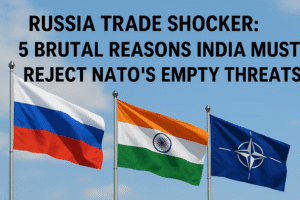Russia Trade Shocker: 5 Brutal Reasons India Must Reject NATO’s Empty Threats
NATO’s threat of secondary sanctions against India for trading with Russia is undermined by glaring Western hypocrisy. Europe continues importing substantial volumes of Russian energy – both as refined petroleum products processed in India and directly as LNG – while criticizing India’s necessary purchases of discounted crude. India rightly prioritizes its citizens’ energy security and price stability, as emphasized by its firm MEA response.
Past US sanctions threats over the S-400 system failed when India refused to yield, demonstrating that coercive tactics are ineffective against a strategically vital partner. Alienating India over legitimate trade risks fracturing the Indo-Pacific cooperation the West seeks. New Delhi has diversified energy sources and will justifiably reject external diktats that ignore both its sovereign interests and Europe’s own reliance on Russian resources. The West must engage India as an equal, not through counterproductive threats.

Russia Trade Shocker: 5 Brutal Reasons India Must Reject NATO’s Empty Threats
The West’s hypocrisy on energy security has reached new heights. NATO Secretary General Mark Rutte’s recent warning—that India, China, and Brazil could face secondary sanctions for trading with Russia—is not just misguided but deeply ironic. The Ministry of External Affairs (MEA) was right to push back, reminding Europe of its own reliance on Russian energy even as it lectures others.
Double Standards in Global Energy Trade
When the West imposed sanctions on Russian oil after the Ukraine war, Europe didn’t stop consuming it—it simply outsourced the dirty work. India, seizing an economic opportunity, bought discounted Russian crude, refined it, and sold the end products back to Europe. A Centre for Research on Energy and Clean Air (CREA) report revealed that by late 2024, India had become the EU’s largest supplier of refined petroleum products. Meanwhile, Europe itself imported record levels of Russian LNG in 2024.
If NATO truly wanted to choke Russia’s war funding, why hasn’t it pressured the EU to stop buying Russian energy altogether? Instead, the West now threatens India—a strategic partner in the Indo-Pacific—for doing what Europe itself continues to do indirectly.
The Futility of Sanctions Threats
The U.S. has tried this before. When India bought the S-400 missile system from Russia in 2018, Washington threatened sanctions under CAATSA. New Delhi stood firm, and eventually, the U.S. had to grant a waiver. Now, with talks of 500% tariffs on Russian trade partners, the West is repeating the same mistake.
Petroleum Minister Hardeep Singh Puri rightly dismissed these threats, stating that India has diversified its crude sources and won’t be pressured. The reality is simple: India’s energy security comes first. With rising fuel demand and price stability at stake, New Delhi cannot afford to bend to Western diktats.
A Strategic Misstep by the West
The bigger question is: Why alienate India over Russia trade when cooperation is needed elsewhere? The U.S. and EU want India’s support in countering China, stabilizing global supply chains, and advancing tech collaborations. Yet, they undermine this partnership by making unreasonable demands on Russia trade.
India has always pursued an independent foreign policy, balancing relations with both the West and Russia. If NATO continues down this path, it risks pushing India closer to alternative alliances like BRICS, where sanctions hold no weight.
The Way Forward: Engagement, Not Coercion
Instead of threats, the West should:
- Acknowledge its own energy trade loopholes before criticizing others.
- Treat India as an equal partner, not a subordinate that must follow unilateral sanctions.
- Focus on diplomatic solutions rather than economic coercion, which rarely works.
India has made its position clear—its national interests come first. The West must decide whether it values a strategic partnership with India or empty posturing on Russia. The choice is theirs.
Final Thought:
The MEA’s sharp response was necessary. India cannot—and will not—compromise its economic stability to satisfy Western hypocrisy. If NATO wants India as an ally, it must engage with respect, not threats.
You must be logged in to post a comment.